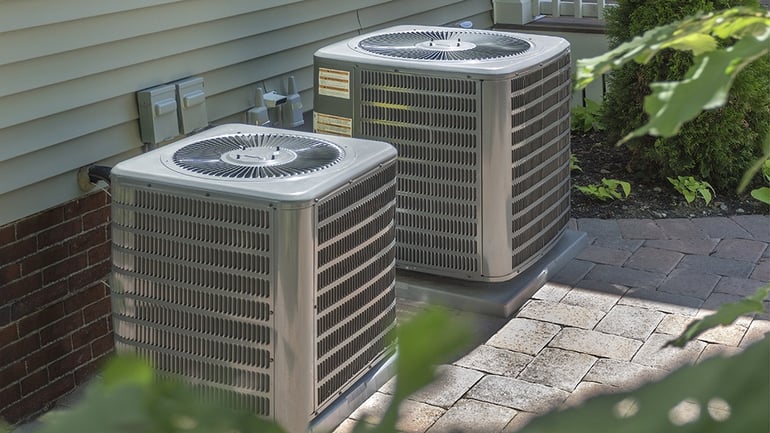
If rattling noises are keeping you and your family awake at night, it may be time to check on your A/C unit. You might be asking, "Why is my air conditioning rattling?"
Indoor or outdoor air conditioner:
Your indoor or outdoor unit could be rattling for a few of the following common reasons:
- Most units use isolation padding to absorb the motion noise produced by the internal parts, especially the fan. These pads can wear over time and begin to crumble and break, increasing the noise level of your air conditioning unit.
- The refrigerant lines could be installed too tightly. In this case, an HVAC technician can easily adjust the air conditioner to resolve the issue.
- A piece of hardware in the motor system could be coming loose. You should call an experienced tech to deal with this as soon as possible.
- The air conditioner’s motor may be failing. The solution is to call a professional before any disconnection occurs or further damage is done.
- If a sudden loud rattle occurs, it could mean a small piece of debris got stuck in the outdoor air conditioner’s compressor fan. To fix it, turn off the unit and remove the visible obstruction.
After removal, check for any damage done to the condenser coils, compressor, and fan. If anything is bent, call a pro for repairs.
There are a few other noises that parts of your home’s system could be making, in which case you should follow our advice below:
Ductwork:
A quiet rush of air is reasonable to hear from the ductwork, but if you hear a hiss, the coolant is leaking and the ducts are improperly sealed. This requires immediate attention from an HVAC team.
If you hear a trumpeting or hissing sound from the compressor motor when you shut down the heat pump, you have a leaky internal refrigerant valve. Check with a specialist to schedule an appointment for repair.
Indoor furnace:
This home appliance can make a number of unsettling noises due to all of its components and parts. Each troubling sound means something different, so here’s Warner Service’s breakdown:
- Squealing or screeching means that the furnace’s belt and/or motor bearing is having problems. These issues can be solved with the addition of the correct lubricating oil or an inexpensive repair from a professional.
- Banging noises indicate that you need to shut off your entire furnace because a large part of it needs to be checked out by an expert and replaced immediately.
- A “thwapping” sound is typically indicative of something stuck in the fan blades. This problem isn’t dangerous, but it could hinder the longevity of the system’s motor, so carefully shut off the blower and remove the roadblock.
- Clicking is typically heard when you turn the system on and off. However, if it’s coming from the control panel or outside compressor, reset the system.
- Furnace vibrations sound similar to an out-of-balance washing machine because the motor is most likely off balance. This isn’t a devastating issue, but it shouldn’t be ignored. Call a specialist as soon as possible.
- If you have a gas or oil-fired system, and you hear an unusual rumbling sound associated with combustion, call for service immediately.
- Buzzing means that your A/C unit is wearing down from time. Begin looking for a replacement appliance as soon as you can.
- A chirping noise is usually a sign that two parts are rubbing together without proper lubrication. If it’s short and high-pitched, the best way to diagnose the issue is to wait a few minutes and write down what happens.
If the sound goes away, the issue is likely minor. In this case, take your notes to an HVAC technician during your next maintenance visit. If it doesn’t go away and/or becomes a squeal, call an expert for closer examination.
To keep your air conditioner optimally running, keep an ear out for these noises and download our popular HVAC Maintenance Checklist by clicking the button below:



